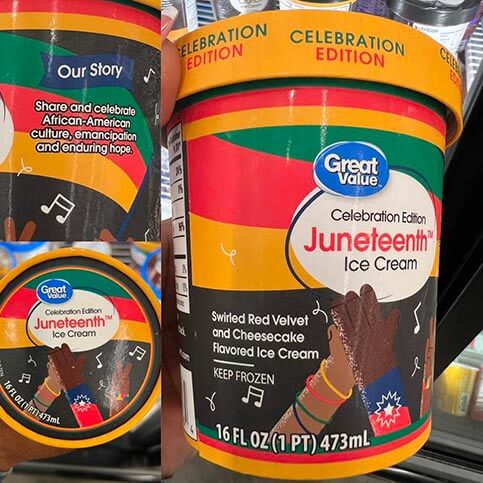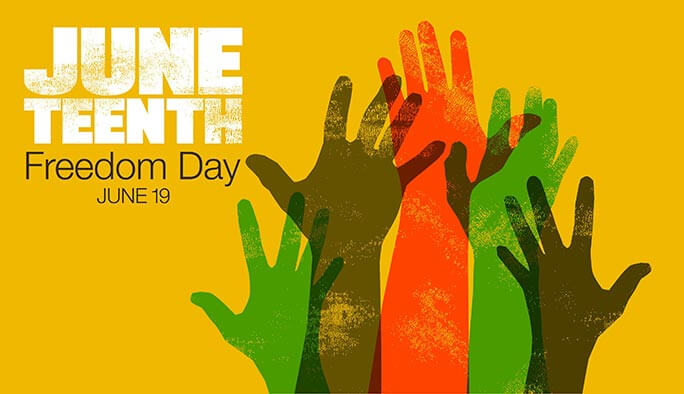With the recent passage of federal legislation recognizing June 19 as Juneteenth National Independence Day and the heightened focus on diversity, equity, and inclusion issues, this once-obscure holiday is getting a lot more attention. Given the complex and painful history and enduring legacy of slavery in this country, deciding how to commemorate Juneteenth can be challenging and confusing for organizations and for individuals. This article highlights some of the complexities of the holiday and offers suggestions on how to honor the day appropriately.
As the newest federal holiday, recognition of June 19 as Juneteenth National Independence Day is gaining more visibility each year. The legislation creating the federal holiday was passed by President Biden in 2021 after decades of previous attempts to formally recognize this important date in America’s history.
Although its name is an unusual one, Juneteenth commemorates the day Union Army Major General Gordon Granger rode into Galveston, Texas on June 19, 1865, to inform 250,000 still-enslaved Texans that they were now free.
Not surprisingly, Texas became the first state to officially recognize Juneteenth as a state holiday, but not until 1980, more than a hundred years later. Today, all but one state (South Dakota) now recognizes Juneteenth as a holiday.
Overall, America is excited and honored to celebrate how far we’ve come regarding racial divisiveness.
Why do some consider Juneteenth controversial?
This can be a loaded question in some circles, but it’s an important one to consider as organizations enhance and expand their efforts to become more diverse and inclusive.
Depending on who you ask, here are just a few of the differing perspectives that surround the holiday:
- Juneteenth commemorates the end of slavery in the United States, yet slavery did not end immediately after President Lincoln signed the Emancipation Proclamation in 1863. Most historians consider the Emancipation Proclamation as a call to action and it only applied to states that had seceded the United States. It wasn’t until the Thirteenth Amendment was added to the US Constitution that groups of enslaved people were set free. And it was decades and iterations of amendments after that before freedom and equal rights were issued to more back Americans.
- Recent racially-charged events in the U.S. have ignited passionate discourse over the teaching of America’s complicated racial history, dealing with issues such as critical race theory, white privilege, and racial equity and equality. Many argue that the realities of America’s racial history have not been accurately reflected, if covered at all, in public school education, while others claim that there is an overemphasis and oversimplification of racial issues.
- Increased focus on Juneteenth has been generated by the Black Lives Matter movement, an organization whose tactics and recent financial management issues are receiving public scrutiny in some circles.
- Many black Americans continue to face systemic race-related challenges in the areas of employment, housing, education, incarceration rates, and persistent health disparities. Some believe that the focus on a federal holiday detracts from the underlying issues that remain. Amara Enyia, a policy research coordinator for the Movement for Black Lives, warns that commemorating Juneteenth at the federal level isn’t a substitute for substantive action. She says, “What people are really looking for beyond symbolic acknowledgment is tangible policies from the federal government that actually speak to whether or not they acknowledge this country’s history and its present.”
When celebrating Juneteenth backfires

CREDIT: ROY WOOD. JR./ TWITTER
Many are cautious about how to commemorate Juneteenth without being offensive to black Americans, and with good reason. Already this year, a few prominent companies have missed the mark in very public ways.
- Walmart introduced a new red velvet and cheesecake-flavored ice cream called “Celebration Edition: Juneteenth Ice Cream” under its Great Value brand, along with Juneteenth-themed party plates. The company’s not-so-subtle attempt to capitalize on the holiday sparked tremendous backlash. A Twitter user responded by saying that “Walmart could’ve supported Black owner brands and put them on their shelves. Instead, they chose to promote their own brand, Great Value, and trademark Black emancipation.” Walmart subsequently issued an apology and removed the ice cream from store shelves.
- The Children’s Museum of Indianapolis came under fire after a photograph of a pre-packaged watermelon salad offered as part of its Juneteenth Jamboree went public. After removing the item from their menu, the museum issued a statement stating that “We are currently reviewing how we may best convey these stories and traditions during this year’s Juneteenth celebrations as well as making changes around how future food selections are made by our food service provider.”
- Food is a very important part of black American culture. However, without understanding the traditional foods common among black Americans within the context of their history, it’s easy to get it wrong. An IKEA store in Georgia learned this the hard way when store management decided to incorporate a holiday menu that featured food that has typically stereotyped black culture. Employees were sent an email telling them to “Look out for a special menu on Saturday which will include: [sic] fried chicken, watermelon, mac n cheese, potato salad, collard greens, candied yams.”
It all sounds innocuous enough on the surface, but as one employee told CBS, “You cannot say serving watermelon on Juneteenth is a soul food menu when you don’t even know the history – they used to feed slaves watermelon during the slavery time.” IKEA issued a statement admitting,“We got it wrong and we sincerely apologize. We are committed to educating ourselves and putting a process in place that will allow us to thoughtfully honor Juneteenth in the future.”
As a rule of thumb, it’s not a good idea to leverage Juneteenth as an opportunity to introduce novelty-themed products to generate additional revenue. Nor should you try to create another “shopping day” to promote product deals nor attempt to demonstrate an organization or individual’s “wokeness.” The holiday deserves more sensitivity and respect for what it really represents to many black Americans, particularly those who are aware of their own family legacies and historical accounts involving ancestors who lived during slavery and their descendants who’ve been impacted by the lingering inequalities.
It’s also important not to attempt anything that may unwittingly play into common and often negative stereotypes of black Americans, like wearing a dashiki to work, bringing fried chicken to a pot-luck lunch or dinner, or playing gangsta rap music to demonstrate that you’re “down with the cause.”
It’s safest to take the lead from the black Americans within your circles. If you’re not sure what you can do to acknowledge the significance of the day, ask. If you’re still not sure what to do, less is usually better.
Tangible ways to acknowledge the day
When thinking about how to acknowledge Juneteenth, it’s important to realize that while this holiday marks the end of slavery, which is something to celebrate, it also reminds many of the tragedy and travesty of slavery’s existence in our country’s history in the first place. It’s also a reminder of still how far we still have to go to achieve equality and a reward system based on the content of one’s character, not the color of skin. As a result, sensitivity to the complexity of this holiday is essential.
Organizations and individuals can honor what the end of slavery really means by celebrating our country’s efforts to heal the racial divide, acknowledging the significant successes that many black Americans have achieved in all walks of life. And we can support efforts that address the remaining systemic challenges preventing full participation in all parts of our society by creating opportunities for more equitable access to opportunities for all.
Consider the following suggestions for how to observe the holiday:
- Identify local events that you can attend and/or support by volunteering to help before, during, or after the holiday. EventBrite, your local news website, or websites featuring upcoming community events are great places to start. Ask friends, colleagues, neighbors, and other people you know how they may be honoring the day. If you don’t have any people of color in your networks, reaching out and getting to know someone new is a great place to start.
- Support black-owned businesses, either in your community or online. Your local Chamber of Commerce or lists like this one of 15 Black-Owned Small Business Directories can help you locate black-owned businesses offering a wide variety of products and services.
- Challenge yourself to learn more about African American history. Utilize documentaries, memoirs, museums, books, and movies to learn more about personal experiences relating to race. There are countless incredible stories within the black community about overcoming tragedies and seemingly insurmountable odds.
- Tour a black historical and/or cultural museum or exhibit. You may be able to find one near you on this list of 12 of the best black history museums in the US and where to find them. Even if you can’t find one close enough to visit, find one that has a virtual exhibit you can explore. Remember too that you don’t have to limit your exploration of African American culture to Juneteenth. Try planning a visit to a museum that interests you during an upcoming vacation.
- Join a MeetUp or other group in your community that’s having face-to-face conversations on tackling racial relations issues in your local community. If you want to change the world, starting in your own backyard is a great first step.
Juneteenth is the perfect example of a holiday in which small, sincere efforts mean a lot more than splashy big ones; which often end up doing more harm than good. Educating yourself on the history of slavery and being in a mindset to learn is a great place to start. As Maya Angelou said, “Do the best you can until you know better. Then when you know better, do better.”
Sydney Thomas works to empower female solopreneurs across the globe. She has a Certificate in Women’s Entrepreneurship from The Bank of America Institute for Women’s Entrepreneurship at Cornell University and is currently pursuing a PhD with a focus on Conscious Business Ethics. She is a contributing writer for Matchwell as an expert voice on diversity, equity and inclusion. If you want to learn about Sydney and the work she is doing visit her website: https://www.sydneytylerthomas.com/.

